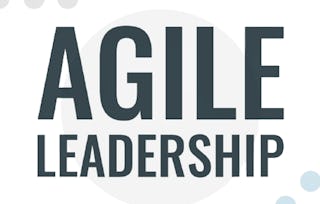This is a foundational course in the Agile Leadership Specialization. By the end of this course, you will build an understanding of key agile leadership concepts. You will begin building a toolbox that will give you an ability to evaluate and create a baseline for yourself as an agile leader. You will access your team’s readiness for change. You will also analyze to what degree an organization is agile, and evaluate its ability to respond to change triggers.

Gain next-level skills with Coursera Plus for $199 (regularly $399). Save now.

Agile Leadership: Introduction to Change
This course is part of Agile Leadership Specialization

Instructor: Oxana Trotsenko
56,037 already enrolled
Included with
(2,363 reviews)
Recommended experience
What you'll learn
Describe how and why change management approaches emerged in the business world
Distill key characteristics of an agile leader
Compare traditional and agile teams
Compare and contrast traditional and agile organizations
Skills you'll gain
Details to know

Add to your LinkedIn profile
10 assignments
See how employees at top companies are mastering in-demand skills

Build your subject-matter expertise
- Learn new concepts from industry experts
- Gain a foundational understanding of a subject or tool
- Develop job-relevant skills with hands-on projects
- Earn a shareable career certificate

There are 4 modules in this course
Agile was born out of necessity driven by a changing business environment. But what triggered this change exactly? This week, you will define change and transformation, and examine change intensity levels and the reasons behind change acceleration. Because change management plays a critical role in helping us successfully transform organizations from traditional to agile, you will be introduced to a brief history and the reasons behind the creation of change management theories.
What's included
12 videos5 readings1 assignment1 discussion prompt
Agile leadership is a fairly new concept, and it is typically used in contrast to traditional leadership. This week, you will continue to build the foundational vocabulary for this Specialization by defining a traditional and agile leader and identifying their key characteristics. Are you wondering which one is better? You will be able to answer this question by the end of this week (the answer might surprise you). You will complete the week by analyzing yourself as a leader to understand where you fall on the agility scale. You will be using this assessment in Course 2 to benchmark your personal transformation.
What's included
5 videos2 readings3 assignments
In this module, we will transition into the realm of the team. In order to transform your team, you need to understand the difference between a traditional and agile one. You will learn the definitions and key characteristics of both. You will also be introduced to the role and responsibility of a leader in leading an agile team. You will conclude the week by assessing your team’s level of agility. Similarly to your own assessment, you will be using your team’s baseline assessment to design an agile transformation plan later in the specialization.
What's included
5 videos1 reading3 assignments
In the last module of this course, we will expand the concepts of traditional and agile to an organizational level. You will learn the definitions and key characteristics of a traditional and agile organization. At the end of the module, you will analyze an organization for its agility. By the end of the last module, you will have a strong foundational knowledge of concepts for the continued journey of Agile Leadership. You will use the three completed assessments when building a comprehensive roadmap for agile transformation as a part of the Capstone course.
What's included
4 videos2 readings3 assignments
Earn a career certificate
Add this credential to your LinkedIn profile, resume, or CV. Share it on social media and in your performance review.
Instructor

Offered by
Explore more from Leadership and Management
 Status: Free Trial
Status: Free TrialUniversity of Colorado System
 Status: Free Trial
Status: Free TrialUniversity of Colorado System
 Status: Free Trial
Status: Free TrialUniversity of Maryland, College Park
 Status: Free Trial
Status: Free TrialUniversity of Colorado System
Why people choose Coursera for their career




Learner reviews
2,363 reviews
- 5 stars
81.71%
- 4 stars
15.19%
- 3 stars
1.90%
- 2 stars
0.55%
- 1 star
0.63%
Showing 3 of 2363
Reviewed on Dec 17, 2024
I really enjoyed this course and have recommended it to my colleagues in hopes that they also adapt Agility, to make our work environment more cohesive and ready for change.
Reviewed on Sep 28, 2023
The content is so spot on and Oxana does a great job delivering it in small easy-to-understand chunks. Can't wait for the next course!
Reviewed on Aug 19, 2021
the course is very basic but for strong build is important. its based on why agile . which is important for every practitioner
Frequently asked questions
To access the course materials, assignments and to earn a Certificate, you will need to purchase the Certificate experience when you enroll in a course. You can try a Free Trial instead, or apply for Financial Aid. The course may offer 'Full Course, No Certificate' instead. This option lets you see all course materials, submit required assessments, and get a final grade. This also means that you will not be able to purchase a Certificate experience.
When you enroll in the course, you get access to all of the courses in the Specialization, and you earn a certificate when you complete the work. Your electronic Certificate will be added to your Accomplishments page - from there, you can print your Certificate or add it to your LinkedIn profile.
Yes. In select learning programs, you can apply for financial aid or a scholarship if you can’t afford the enrollment fee. If fin aid or scholarship is available for your learning program selection, you’ll find a link to apply on the description page.
More questions
Financial aid available,





